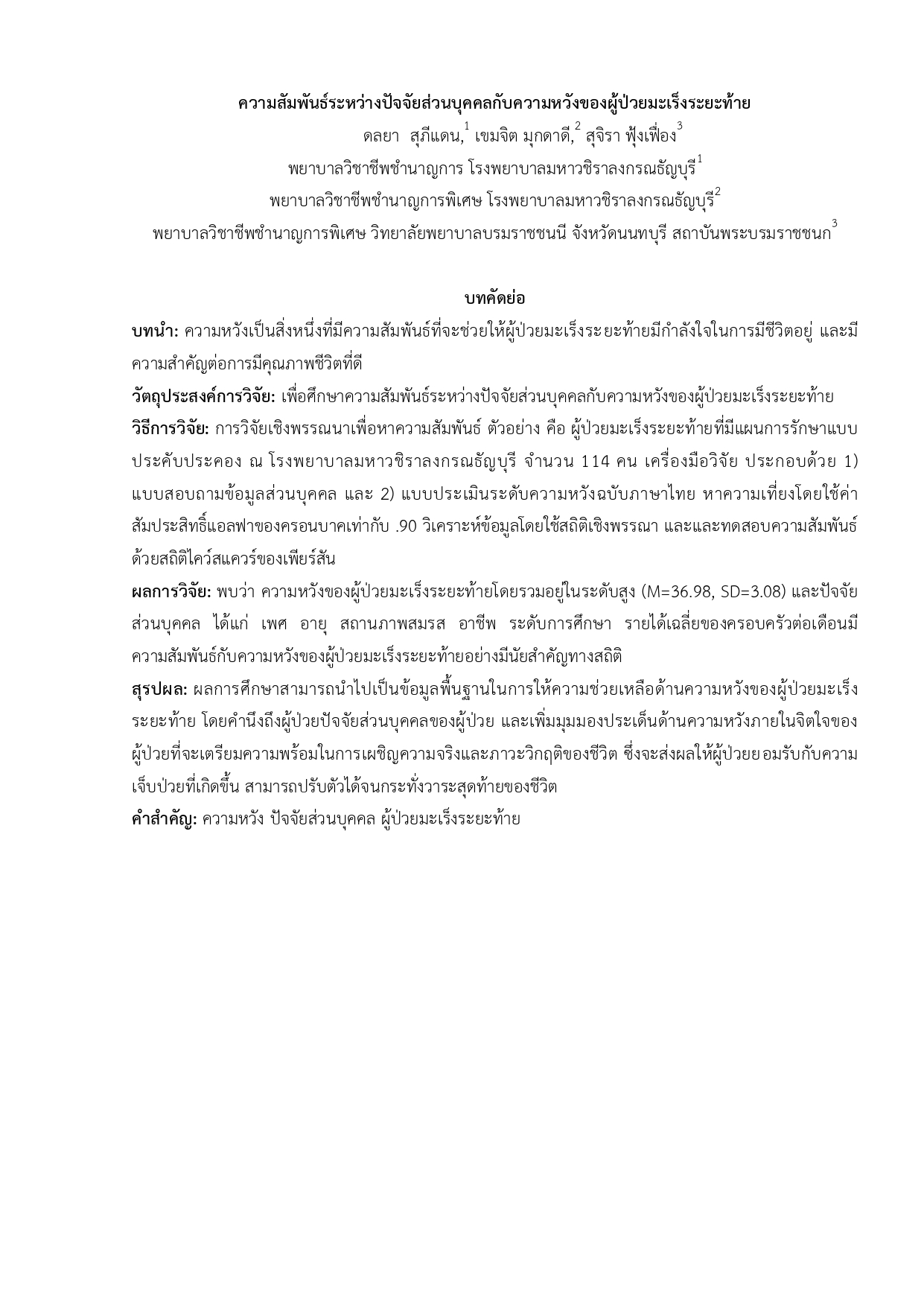The relationship between personal factors and hope in terminal cancer patients
Keywords:
hope, personal factors, terminal cancer patientsAbstract
Background: Hope is one of things that will help patients with terminal cancer stay motivated to live, and is an important aspect to a good quality of life.
Objective: This study aimed to describe the relationship between personal factors and hope in terminal cancer patients.
Methods: A descriptive correlational study used 114 terminal cancer patients who received palliative treatment plans recruited from Maha Vajiralongkorn Thanya buri Hospital. The instruments consisted of 1) a demographic characteristic questionnaire and 2) The Herth Hope Index (HHI) Thai version with reliability of Cronbach’s Alpha of .90. The data was analyzed using descriptive statistics and Pearson’s chi-square test.
Results: The results revealed that the overall hope of terminal cancer patients was high (M=36.98, SD=3.08) and the personal factors were sex, age, marital status, occupation, educational level, and the mean family income per month, which had correlations to hope of terminal cancer patients.
Conclusions: The results of this study provide basic information used for helping patients with terminal cancer, which should take into account the patient's personal factors and increase their perspective on the issue of hope within the patient's mind, mind, preparing them to face the realities and crises of life. This will result in the patient accepting the illness that has occurred and adapting to the end of their life.
References
Snyder CR. Hypothesis: There is hope. In CR Snyder (Ed.), Handbook of hope: Theory, measures, and applications (pp. 3-21). Academic Press; 2000. https://doi.org/10.1016/B978-01 2654050-5/50003-8.
Groopman JE. A strategy for hope: A commentary on necessary collusion. J Clin Oncol. 2005; 23(13):3151-2. doi: 10.1200/JCO.2005.02.009.
Proserpio T, Ferrari A, Lo Vullo S, Massimino M, Clerici CA, Veneroni L, et al. Hope in cancer patients: the relational domain as a crucial factor. Tumori. 2015;101(4):447-54. doi: 10.5301/ tj.5000366.
Nierop-van Baalen C, Grypdonck M, van Hecke A, Verhaeghe S. Associated factors of hope in cancer patients during treatment: A systematic literature review. J Adv Nurs 2020;76(7):1520-37. https://doi.org/10.1111/jan.14344.
Clayton JM, Hancock K, Parker S, Butow PN, Walder S, Carrick S, et al. Sustaining hope when communicating with terminally ill patients and their families: a systematic review. Psychooncology. 2008;17:641–59. doi: 10.1002/pon.1288.
Clayton JM, Butow PN, Arnold RM, Tattersall MH. Fostering coping and nurturing hope when discussing the future with terminally ill cancer patients and their caregivers. Cancer. 2005; 103(9):1965-75. doi: 10.1002/cncr.21011.
Herth KA, Cutcliffe JR. The concept of hope in nursing 6: research/education/policy/practice. Br J Nurs. 2002;11(21):1404-11. doi: 10.12968/bjon.2002.11.21.12277.
Kylmä J. Despair and hopelessness in the context of HIV – a meta‐synthesis on qualitative research findings. J Clin Nurs. 2005;14(7):813-21. doi: 10.1111/j.1365-2702.2005.01154.x.
Wikström B, Lorentzen B, Lorentzen S. Gender differences in hope and its relevance to depression symptoms among Norwegian adolescents. Open J Nurs. 2018;8:157-69. doi: 10.4236/ojn.2018.82014.
Poticharaen B. Relationships between personal factors, social Support and hope of Aids patients in counseling clinic, Hospitals under The Jurisdiction of Bangkok Metropolitan Administration [thesis]. Bangkok: Chulalongkorn University; 1996. (in Thai).
Miller JF. Hope: A construct central to nursing. Nurs Forum. 2007;42:12-9. http://dx.doi. org/10.1111/j.1744-6198.2007.00061.x
Herth K. Fostering hope in terminally-ill people. J Adv Nurs. 1990;15(11):1250–9. https://doi. org 10.1111/j.1365-2648.1990.tb01740.x.
Cohen J. (1988). Statistical Power Analysis for the Behavioral Sciences (2nd ed.). Hillsdale, NJ: Lawrence Erlbaum Associates, Publishers; 1988.
Wattanabenjasopa S. Effect of supportive psychotherapy group on hope of cervical cancer patients receiving radiotherapy [thesis]. Chiangmai: Chiangmai University; 2000. (in Thai).
Block B. Hope of patients and dying of cancer. In: KrzyZanowski D, Payne M, Fall A (eds.) PRESSCOM: Wrocław, Poland; 2013.
Baczewska B, Block B, Kropornicka B, Niedzielski A, Malm M, Łukasiewicz J, et al. Hope of recovery in patients in the terminal phase of cancer under palliative and hospice care in Poland. BioMed Res Int. 2020;7529718. https://doi.org/10.1155/2020/7529718.
Baczewska B, Block B, Kropornicka B, Niedzielski A, Malm M, Zwolak A, et al. Hope in hospitalized patients with terminal cancer. Int J Environ Res Public Health. 2019;16(20):3867. doi:10.3390/ijerph16203867.

Downloads
Published
How to Cite
Issue
Section
License
บทความที่ได้รับการตีพิมพ์ในวารสารหัวหินเวชสาร เป็นลิขสิทธิ์ของโรงพยาบาลหัวหิน
บทความที่ลงพิมพ์ใน วารสารหัวหินเวชสาร ถือว่าเป็นความเห็นส่วนตัวของผู้เขียนคณะบรรณาธิการไม่จำเป็นต้องเห็นด้วย ผู้เขียนต้องรับผิดชอบต่อบทความของตนเอง






